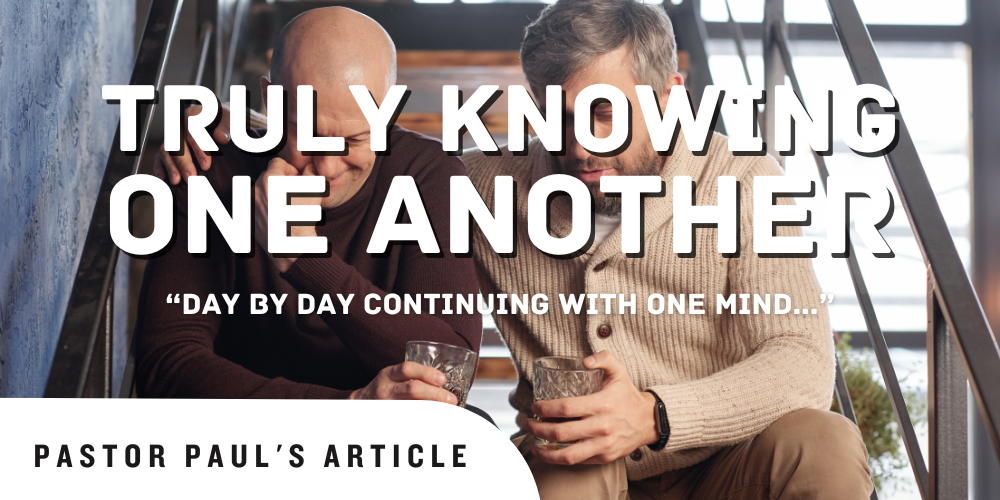Day by day continuing with one mind in the temple, and breaking bread from house to house, they were taking their meals together with gladness and sincerity of heart, praising God and having favor with all the people. And the Lord was adding to their number day by day those who were being saved.
Acts 2:46–47 – (NASB95)
The passage above is one of my favorite descriptions of the early church because they experienced a joyful unity while they exhibited transparency and honesty. Those qualities set them apart from the unbelievers around them who, like today, were often phony, hypocritical, and dishonest about who they really were. The Gospel sets us free from fear of rejection and encourages us to be genuine with one another (including the freedom to admit faults and sins and ask for help). When this was disrupted in Acts 5:1ff (the lies of Ananias & Sapphira), God moved quickly to show His displeasure.
For months my heart has been burdened for people who don’t feel free to let people know how they are really doing. Some people hide the private pain of sinful behavior and relationships while they publicly appear to be doing great. I think I know them, but I really don’t. When they finally reveal what has been going on for years, they often include reasons why they didn’t tell anyone before. It is heartbreaking to hear how their misunderstanding of God’s grace and the resources available through their local church led them to live a double life in fear of being found out.
This week I read a devotional by Paul Tripp (PaulTripp.com). He expressed my concern for these kinds of relationships in local churches along with some practical steps we can take to get beyond the facades and help each other overcome sin and live fruit-filled lives. Please prayerfully read Paul Tripp’s devotional below and discuss it with others. At The Bridge, let’s develop an atmosphere of grace, and relationships characterized by gladness and sincerity of heart, where people are free to share how they are really doing and get help.
Everyone felt like they knew Betty and Brad. Their presence was so central to the life of our church that no gathering seemed official without them. I had spent many hours in ministry meetings with Brad, we had meals as a couple, and our families picnicked together. Brad proceeded to spill the drama of his marriage and family into my lap. He didn’t describe the “typical” arguments and struggles that every couple experiences. He and his wife were in the midst of full-blown violence, divorce filings, alcohol, and devastated children.
I was stunned and silent. It was hard for me to pay attention because the portrayal of his life was so disorienting and foreign. I had known this man for years—or so I thought—yet I knew nothing of what he was telling me now. My mind went to the many hours we had spent with this family. I had assumed I knew them, so I had never asked anything that would give them an opportunity to say anything about the true state of their personal lives.
How could such an alternative and destructive reality have gone on without anyone in our church knowing? At that moment, I realized that I, and our church family, had failed to know Betty and Brad and their family. I mean, truly know them. We knew facts about them, but we didn’t know them.
Within the body of Christ, we tend to have permanently casual relationships that never grow into authentic intimacy. We live frenetically busy and distracted lives, with activity-based friendships, punctuated by brief superficial conversations with each other.
We know some facts about each other, but these facts fool us into thinking that we know the souls of the human beings when we actually don’t. As a result, we fail to pursue others with good questions.
Our effectiveness as instruments of change is blunted because we don’t know others well enough to know where change is needed or where God is actively at work.
Think about it. Most of the conversations you had recently were mundane and rather self-protective. We spend most of our time discussing things of little personal consequence—the weather, politics, sports, and entertainment. We must not let ourselves become comfortable with the casual.
How much do you know of your friend’s family of origin? Do you know where they struggle in their relationship with God or in their understanding of Scripture? What do you know about the quality of their marriage or the struggles they experience with their kids? If they are single, divorced, or widowed, do you know how they spend their hours alone?
Could your friend be fighting disintegrating relationships at work or long-term problems with extended family? Perhaps their heart is driven by lust, eaten up with bitterness, or addicted to some substance. Might they be harboring deep regret over a past decision or jealousy over the successes of a friend? Are there financial woes or physical problems?
Heart-and-life changing personal ministry is dependent on a rich base of personal information. You cannot effectively minister to someone you do not know.
Christ entered our world and fully understands what we are going through, responding with appropriate and specific help. This is powerfully portrayed for us in Hebrews 4:14–16:
“Since then we have a great high priest who has passed through the heavens, Jesus, the Son of God, let us hold fast our confession. For we do not have a high priest who is unable to sympathize with our weaknesses, but one who in every respect has been tempted as we are, yet without sin. Let us then with confidence draw near to the throne of grace, that we may receive mercy and find grace to help in time of need.”
Since he is our model for everything we do in ministry, we too need to understand people so that we can serve him in their lives. We too must be committed to entering their worlds.
We can begin by taking the time to ask good questions and listen well so that we might start the process of knowing them at the heart level.
Only then will we be able to apply the truths of the gospel in a way that is specific and transformative.
A Prayer for Today: Lord, would you help me to be the kind of friend who is able to apply the truths of the gospel to others’ lives in a way that is specific and transformative? Would you help me to continually enter their worlds, ask them good questions, listen well to their answers, and understand them well so I can serve you in their lives? Please help me to be more and more like you, Jesus, as I walk alongside my friends in this world. In your name I pray, amen.
God bless,
Paul David Tripp
Reflection Questions
- Would you say that the people who are closest to you are friends who truly know you or just know about you? What about the other way around? Do you have friends who you truly know, or do you just know about them?
- Are your friendships more in the category of “permanently casual” or “authentically intimate”? Have you become the type of person who is comfortable with the casual in your friendships?
- Take some time to do an inventory of the content of your conversations with your closest friends. What percentage of those conversations get to the heart of knowing the other person? What percentage of those conversations are spurring one another along toward walking closely with God and reminding each other of the gospel?
- How can you be more intentional at getting to know your closest friends on a deep level? In what ways can you be more intentional about asking good questions and listening well so that you might start the process of knowing them at the heart level? In what ways can you pray for your friends that will soften your heart toward them and love them well once you get the chance to engage them in conversations?

